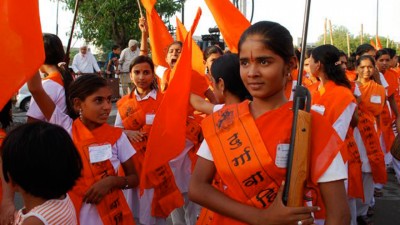| Reviews & Columns |
|
Reviews DVD TV on DVD Blu-ray 4K UHD International DVDs In Theaters Reviews by Studio Video Games Features Collector Series DVDs Easter Egg Database Interviews DVD Talk Radio Feature Articles Columns Anime Talk DVD Savant Horror DVDs The M.O.D. Squad Art House HD Talk Silent DVD
|
DVD Talk Forum |
|
|
| Resources |
|
DVD Price Search Customer Service #'s RCE Info Links |
|
Columns
|
|
|
World Before Her, The

Reviewed at the 2012 Tribeca Film Festival
Nisha Pahuja's The World Before Her is a clear-eyed and powerful look and sexual identity and feminism in India, as seen through the eyes of two young women with very different ideas about empowerment. Ruhi is one of the twenty contestants for the Miss India title, one of the few opportunities for young women to find economic success and equality in her country. "I think of myself as a very modern woman, and I want freedom," she says, simply enough. Prachi is seeking her freedom too, but via a more aggressive method: she has spent most of her life at camps run by Durga Vahini, the women's wing of the fundamentalist Hindu movement. She's tough and strong, and she works the younger girls like a drill sergeant.
The Miss India contestants are subjected to a 30-day grooming and training regime, which Pahuja and editor David Kazala cleverly and often startlingly juxtapose with the intense Durga Vahini boot camp. The beauty contestants go for diction and posture work; the young fundamentalist girls go to lectures and sermons. The former must brave Botex and skin whitening sessions; the latter, self defense and gun training. And thus, the ideological split between the old and the new is brought to vivid life.
The way Pahuja threads the needle is fascinating. Early on, it appears that she's adopting a point-of-view that favors Prachi, finding the Miss India pageant gaudy and exploitative--while maintaining sympathy of good-hearted Ruhi and practical Ankita, another contestant. At first, the Durga Vahini camps seem a home for self-awareness and reflection: "Where has the self-respect of Indian women gone?" asks one lecturer. "We don't know who we are anymore!"
But Pahuja slowly, subtly lets the troublesome cracks in the Durga Vahini façade begin to show, making the trickier point: the beauty contest is objectification, yes. But what about the way that women are, by matter of form, repressed in the Hindu religion (and many others)? "Girls should be married by the age of 18, because by the age of 25, they are too strong-willed," explains one helpful instructor at the Durga Vahini camp. "Chasing a career--is that really necessary?" This resistance to women's liberation don't stop wih words; Pahuja provides harrowing footage of women being beaten for being seen with a man, seen in a bar, seen drinking alcohol. Prachi's own father admits that he has beaten her "a lot... You have to hit her to make her listen." Prachi forgives him, because "he let me live." (In a society where male children are valued and females unwanted, something like 750,000 female fetuses are deliberately aborted every year, and more are neglected and left to die.)
Of course, none of this makes the pageant process any less appalling; aside from the aforementioned Botox and skin whitening, there is a disgusting scene in which the pageant director stages a beach runway show with the contestants cloaked in a sheet, covering them from the waist up, so that we can only see (and focus) on their legs. Ankita tries in vain to shrug it off. "We want to achieve our dreams," she explains, "but at what cost?"
These scenes, on both sides, are by turns heartbreaking and infuriating, and Pahuja doesn't look away from them. The intertwining of the narratives if often ingenious--particularly tart is the intercutting of the pageant day and the camp's graduation day, in which a group of girls discuss that their sashes are "just like Miss India." But there is a sense, when watching The World Before Her, of a missing piece; it feels like we should have some sense of something in the middle, a confirmation that these are not the only two options.
The pageantry of the festival is given the counterpoint of Pachi and her family watching and sneering. Well, to be fair, Pachi and her lovely father do the sneering; her mother, fascinatingly enough, is the most thoughtful and considered, with a nuanced opinion about the imperfect nature of progress. The World Before Her is an excellent and important documentary, but it could have used a few more voices like that.
Jason lives in New York. He holds an MA in Cultural Reporting and Criticism from NYU.
|
| Popular Reviews |
| Sponsored Links |
|
|
| Sponsored Links |
|
|
| Release List | Reviews | Shop | Newsletter | Forum | DVD Giveaways | Blu-Ray | Advertise |
|
Copyright 2024 DVDTalk.com All Rights Reserved. Legal Info, Privacy Policy, Terms of Use,
Manage Preferences,
Your Privacy Choices | |||||||











